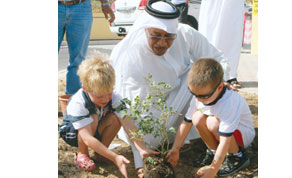 |
|
Dr al-Hajari helping two students plant a sapling yesterday in Education City |
Qatar Foundation (QF) has joined the Plant for the Planet: Billion Tree Campaign of United Nations Environment Programme (UNEP).
A group of students from Qatar Academy planted 10 saplings from seven species in the Education City yesterday under the auspices of QF Green Projects.
The saplings were planted in front of Texas A&M University at Qatar’s Engineering Building and opposite Central Plant I.
QF vice chairperson Dr Saif al-Hajari and Health, Safety, Security & Environment (HSSE) Directorate director Abdulla al-Modhaki were present.
“Olive, miswak (toothbrush tree), acacia (samour), sidra, henna, cittron (ottruj), and senna (ashrej) are the species planted and almost all of them are native,” assistant researcher Ahmed Elgharib told Gulf Times.
Dr al-Hajari lauded the initiative. “When you plant a tree, you are helping a system which includes CO2 reduction and helping birds and animals,” he told the students.
“You will remember this even after you leave the school. We have a responsibility to behave in the right way towards our environment, which has been at the receiving end even though we have more knowledge and technology,” he said.
Al-Modhaki said one of the key goals of the QF HSSE Directorate is to protect the environment. He urged the students to carry on with such initiatives.
Grade 11 International Baccalaureate (IB) Diploma student Sara Abbas said the tree planting drive was very important to QF as the Education City campus was expanding rapidly.
Afaf al-Aker, another Grade 11 IB student, also agreed that the tree planting programme was a great idea.
Under the Plant for the Planet: Billion Tree Campaign, people, communities, organisations, business and industry, civil society and governments are being encouraged to plant trees and enter their tree planting pledges on the UNEP website (www.unep.org/billiontreecampaign). The objective is to plant at least a billion trees worldwide each year.
The idea for the campaign was inspired by the late Professor Wangari Maathai, Nobel Peace Prize laureate for 2004 and founder of Kenya’s Green Belt Movement, which has planted more than 30mn trees in 12 African countries since 1977.
Recognising that there are many tree planting schemes around the world, UNEP proposes to federate these efforts in both rural and urban areas.
People and entities - individuals, children and youth groups, schools, community groups, non-governmental organisations, farmers, private sector organisations, local authorities and national governments - are encouraged to enter pledges on the online form. Each pledge can be anything from a single tree to several million trees.
The responsibility will lie with the person/organisation making the pledge via the campaign website to arrange for the tree planting.
All contributing participants will receive a certificate of involvement. They will be encouraged to follow up via the website so UNEP can verify that the trees have survived, in partnership with certification mechanisms, such as the Forest Stewardship Council.
The website will record the ongoing tally of pledges, and also publish photos and accounts from registered campaign members of what they have achieved.
The campaign strongly encourages the planting of indigenous trees and trees that are appropriate to the local environment.
Advice on tree planting is available via the website, as well as information about reforestation and other tree-related issues, including links to appropriate partner organisations best equipped to give locally tailored advice, such as the World Agroforestry Centre.
Because ideal planting conditions vary in different regions, the campaign will operate throughout the year.

